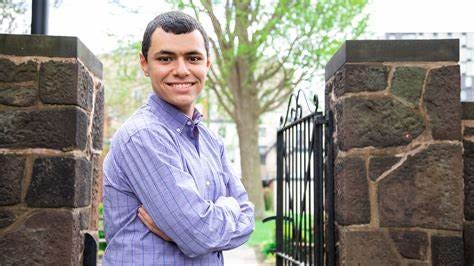How My Time as a Coro Fellow in St. Louis Prepared Me for Law School: OSDFA's Professional Awards Week 2024
Reflection by Adam Soliman, CCAS'22
I wanted to go to law school since I was in high school and was not expecting to do a fellowship or any other gap year. During my junior year at Rutgers-Camden, however, I realized that I could benefit from a focused gap year. While I knew that I had received an excellent education, I wanted to cultivate interpersonal skills that are hard to learn in the classroom, including teamwork, project management, knowing your audience when completing a project, receiving feedback effectively. In that regard, the Coro Fellows Program in St. Louis was exactly what I needed because I honed all of those skills.
In brief, the Coro Fellows Program in St. Louis is a nonpartisan, graduate-level civic leadership training program that lasts for about nine months. It brings a cohort of approximately twelve people from across the country who have already completed at least a bachelor’s degree in any field of study. Each Fellow individually completes five month-long work rotations—essentially mini-internships—at organizations in the government, nonprofit, and business sectors. Fellows also complete a series of group projects. For example, my cohort did a project about Missouri’s state government where we traveled to the state’s capital city and met with lawmakers from the St. Louis metropolitan area and across Missouri. There are also Coro Programs in New York, Pittsburgh, San Francisco, and Los Angeles, each of which have somewhat different areas of focus. The St. Louis program primarily focused on local community governance and the organizations that sustain a community.
Participating in the program pushed me beyond my comfort zone as I regularly had to do projects with which I had hardly any prior subject-matter knowledge. For example, during a rotation at the University of Missouri-St. Louis, a co-fellow and I had to do a project about urban planning education even though neither of us had much knowledge about the urban planning profession. Projects like these allowed me to practice how to learn a new topic quickly and apply my skills to complete a project about it. This was probably the most useful aspect of the program for law school because as a law student, you are expected to learn new subjects and write on them quickly. Thus, although I did not do intensive legal work as a Coro Fellow, it helped prepare me for law school and allowed me to make the most out of my time as a law student thus far.
The most important thing I would say to students considering a gap year is to be intentional about it. Think about the goals for your gap year. Your goals do not have to be very specific, and can be something like improving your professional communication skills. Then research what programs or jobs would be the most helpful to achieve it. While online research is important, it is also helpful to reach out to people who have participated in the programs that interest you through LinkedIn or their work emails to ask about their experiences. You will be surprised at how often people are willing to talk and even offer mentorship.




